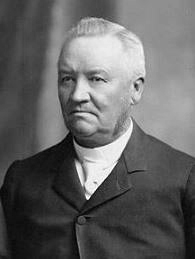User:SignatureBooks/sandbox
| Author | John P. Hatch |
|---|---|
| Cover artist | Connie Disney |
| Country | United States |
| Language | English |
| Series | Significant Diary Series |
| Subject | Anthon H. Lund |
| Genre | Documentary History |
| Publisher | Signature Books |
Publication date | 2006 |
| Pages | 812 |
| ISBN | 1-56085-185-6 |
Danish Apostle: The Diaries of Anthon H. Lund[1], is a single-volume documentary history edited by John P. Hatch and published in 2006 by Signature Books. It includes selected diary entries by Mormon Apostle Anthon H. Lund from the years 1890-1921. It is part of the award-winning "Significant Diary Series," which seeks to publish journals, diaries, and letters of importance to Mormons and Mormon historians.
History[edit]
Danish Apostle documents, through the eyes of Lund, the history of the Church of Jesus Christ of Latter-day Saints during what historian Thomas G. Alexander has called the "transition era."[2] Lund records the decline of polygamy, post-manifesto polygamy, the subsequent Reed Smoot hearings, the excommunication of apostles and church members who refuse to abandon polygamy, and the rise of the Word of Wisdom, the Mormon health code, as an important part of LDS life. Other topics covered by Lund include church businesses such as ZCMI and Amalgamated Sugar, ecclesiastical meetings, Utah statehood, the Utah state capitol commission, changes in the LDS leadership, and church public relations.

Lund Biography[edit]
The volume contains a biographical introduction by editor John P. Hatch. It also includes a timeline of significant life events as well as photographs of Lund with his family and other LDS leaders.
Early Years[edit]
Lund was born in Aalborg, Denmark to unmarried parents. After his conversion to Mormonism, Lund immigrated with his grandmother to the United States. They traveled across the plains and settled, as many Danish converts had done, in central Utah's Sanpete County. Lund quickly rose through the ranks to become a well-respected member of the Danish immigrant community and the LDS Church. He served in the Utah State Legislature and as Manti Temple president.
Apostleship[edit]
Lund was asked to serve in the Quorum of the Twelve Apostles in 1889. He eventually relocated his family to Salt Lake City. In his role as a junior apostle, Lund was called on to serve a variety of missions, including as European mission president (1893-1896) and to travel around Utah to convince members to switch their political allegiance in a bid for Utah statehood. Lund also secretly married two men in post-manifesto polygamous ceremonies. He also served a mission in the Holy Land.
First Presidency[edit]
In 1901, joined the LDS First Presidency under Joseph F. Smith. Lund continued to serve in various capacities, traveling to various congregations throughout Utah and the Intermountain west. He also served as Salt Lake Temple president, often having to deny entrance to those continuing to practice polygamy. Upon the death of Joseph F. Smith, Lund became first counselor to new LDS president Heber J. Grant until his death in 1921.
Legacy[edit]
Hatch argues that Lund bridged the gap between 19th century Mormonism and 20th century Mormonism. He was a key figure in guiding the LDS faith out of an isolationist, polygamous sect to a modern, appearance-conscious American religion. Lund was the first apostle called who was not a polygamist and when some of his colleagues would press for aggressive opposition to the American government, Lund consistently pushed for tame, measured responses to various issues. While Lund's faith mattered deeply to him and he could be traditional, he was, above all, a pragmatist.
Editorial Procedures[edit]
Hatch notes in the introduction that he chose to focus on Lund's association with the LDS Church and his involvement in Utah politics. There are fewer, entries, therefore, on Lund's personal life, his interaction with his wife and children, and leisurely pursuits. Instead, the diaries record Lund's church meetings, the decision making process of the LDS leadership, his involvement in various businesses, and his active role in Utah civics, such as the construction of the Utah state capitol and different committees.
References[edit]
- ^ Hatch, John (2006). Danish Apostle: The Diaries of Anthon H. Lund. Salt Lake City: Signature Books. ISBN 1-56085-185-6.
- ^ Alexander, Thomas G (2012). Mormonism in Transition. Salt Lake City: Greg Kofford Books. p. 412.

